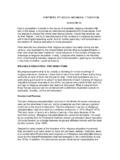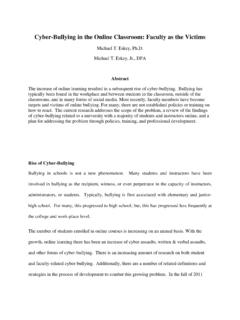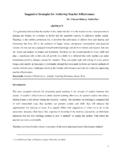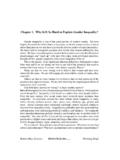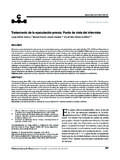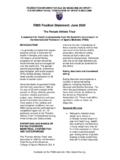Transcription of Chapter 6. Intimate Combat: Sexuality and Gender …
1 Robert Max JacksonDOWN SO LONG ..Working DraftChapter 6. Intimate Combat: Sexuality and Gender InequalityAs a result of Sexuality , Gender inequality dramatically differs from otherforms of inequality such as class or race. Women and men are bound together asintimate couples. And because of reproduction, all people are bound to bothmothers and fathers and other kin of both genders. The obligations andexpectations that bind spouses (and kin) are difficult to avoid or break. Membersof dominant and subordinate groups based on class or race also have directrelations with each other. These include the ties between lord and peasant,between plantation owner and slave, or between factory owner and worker. Still,these lack the peculiar charge and intimacy of Sexuality and reproduction.
2 Sexdistinguishes women from men and sex inextricably binds them is difficult to believe that Gender relations would have ever been the sameif reproduction depended on some completely unemotional exchange, if itinvolved no arousal in either sex and no physical contact. But this is not the , women and men in all societies confront each other in the presence ofenormous sexual tension. We therefore must ask what relation exists betweensexuality and theorists agree we must consider Sexuality if we wish to explain genderinequality and its consequences. They cannot agree, however, about whatmatters. One deep rift dividing theorists concerns causal perspectives. Issexuality a cause or an effect of inequality?In the 1960s, the emerging modern feminist movement stressed a claim thatsociety restricted women to the role of sexual objects while simultaneouslyrepressing their Sexuality .
3 Since then, competing interpretations of Sexuality havedivided feminist activists and theorists into factions. Some, often called radicalfeminists, believe Sexuality is the driving force behind Gender inequality. Othersbelieve that inequality has shaped, or deformed, Sexuality , but consider this justone more consequence of inequality rather than its central Millett's Sexual Politics focused feminist theory onto Sexuality like noother work before it. One major idea motivated Sexual Politics: all sex reflectedthe tension between male dominance and female subordination. This idea was notnew news to the scholars concerned with such issues. But Millet departed fromprevious work by stressing sex's overwhelming importance, proclaiming it witha bluster and wit that inflamed her audience. The intrusion of powerCH. 6 Sexuality P.
4 148113 As Millet somewhat simplistically reduced the relations of inequality betweenthe sexes. 114 The feminist literature has been ambivalent about the myths of differences insexuality. Sometimes they are rejected as false beliefs, sometimes they are accepted as a truebut perverse condition resulting from male dominance, and sometimes they are portrayed astrue differences that show women's superior virtue. Robert Max JacksonDOWN SO LONG ..Working Draftdifferences113 into Sexuality , she charged, completely contradicted the deceptiveideology that camouflaged the intents and effects of , Millet couldn't say what was significant about the relationshipbetween power and Sexuality . Was it primarily proof of the existence of powerdifferences? Was it further evidence that women lived worse lives than men as aresult of inequality? Did it locate the fountainhead of inequality in Sexuality , withmen's desires to act out sexual aggression toward women the major source ofwomen's subordination?
5 Sexuality was surely an issue, but what exactly was theissue?False Myths of Differences in SexualityPopular cultural beliefs portray women's sexual feelings and behavior asstarkly different from men's. Consider these common beliefs about mencompared to women. Men, supposedly, have stronger sex drives, they becomearoused more easily, and they find it harder to control themselves when , men get more enjoyment from sex (because they have more orgasms),they focus their sexual drive more narrowly on intercourse, they feel moresexually possessive, they engage in more extramarital sex, and they have moresex without love. These beliefs paint women in colder, more virtuous , supposedly, have less sexual desire and more control, they have moredifficulty achieving pleasure, they need more emotional closeness to find sexsatisfying, and they have less and large, these portraits depict mythical Illusions aboutsexuality pervade our culture.
6 Before we can make sense of Sexuality 'srelationship to inequality, we must unmask these truth, women and men share similar sexual desires and sexual experiencesduring their lives in this society. Many readers will find this hard to believe,because our culture so successfully contends that they are completely , recent research on Sexuality has shown contemporary women and men differlittle. The sexes share remarkably similar biological foundations. Women andmen have similar subjective experiences of sexual arousal and similar feelingsduring orgasm. They become sexual aroused equally often. They have sexualCH. 6 Sexuality P. 149115 [ Offir]Robert Max JacksonDOWN SO LONG ..Working Draftfantasies equally often and with similar content. They respond similarly to short, women and men experience sexual desire and arousal in much thesame way and to the same degree, despite the distinctive Sexuality attributed tothem.
7 Still, women's and men's Sexuality does differ in important ways relatedto inequality. But before we try to identify those differences, lets try to dispel themost important and inaccurate myths. These myths concern not only the contentof Sexuality , but also what causes sexual experience and AND EXPERIENCEP eople believe that some differences between female and male Sexuality grownaturally and inexorably out of biology. No one would contest the emphaticbiological differences between women's and men's sexual organs. They definesex distinction, after all. Only men have erections. Only women get men ejaculate. Do these physiological differences cause or revealdifferences in Sexuality ? Do they consistently influence desire, anxiety, orenjoyment? Several possibilities have received substantial attention.
8 Many havebelieved that men experience more anxiety over sex because they fear the other side, people sometimes attribute more anxiety to women becausethey are vulnerable to pregnancy. Moreover, our culture has long sustained apopular belief that men get more enjoyment from sex because they achieveorgasm more Anxiety. Many assume men must suffer performance anxietiesunknown to women because men may become impotent. Women, the argumentgoes, need only open their legs to give men access and pleasure. Thereforewomen can perform no matter how they feel. Men, however, must be sexuallyexcited to possess an erection adequate for picture blurs if we look closely. For most young men most of the time,erections are not difficult to achieve (indeed, they sometimes embarrass youngmen by being difficult to avoid). While impotence (or erectile dysfunction in thepopular contemporary phrasing) occurs with increasing frequency as men age,Viagra and similar drugs allow even men with impotence issues to achieveerections most of the time.
9 Indeed, in this society women have surely fearedmen's ready capacity for erection far more than the possibility that a man wouldprove unable to , if we consider Sexuality independent of cultural expectations,erections are not crucial to heterosexual pleasure or success. Women's sexualsatisfaction does not depend so much on intercourse as the stimulation of theCH. 6 Sexuality P. 150 Robert Max JacksonDOWN SO LONG ..Working Draftclitoris. Men's erections give no biological basis to male anxiety over pleasingwomen. Nor could it be that men have cause to be more anxious than womenabout achieving pleasure for themselves. Research has consistently shown menachieve more orgasms than does not mean that men cannot suffer performance anxiety. If mentypically experience performance anxiety, however, the biological differencesbetween the sexes cannot be the cause.
10 Instead, the anxiety must stem fromsocially constructed sexual expectations. We will return to those Anxiety. Perhaps the picture just needs to be reversed. Some havebelieved that anxiety may restrain women's Sexuality more than men's becausewomen are vulnerable to pregnancy. Certainly, women have had to assume a riskof pregnancy through much of history. And this has undoubtedly constrainedtheir willingness to engage in sex outside of marriage whenever a pregnancywould be socially unacceptable (true in many but not all societies). This does not apply well to modern societies, however. Methods to prevent(contraception) or remedy (abortion) pregnancy have been technically availablefor a long time. In a modern society, women may still experience this anxiety,but it is usually situationally specific. Most importantly, before they becomesexually active, many young women are both inexperienced and unprepared fortheir first sexual experiences, so that having sex with a man carries a threat ofpregnancy unless the man takes the initiative with contraception.
